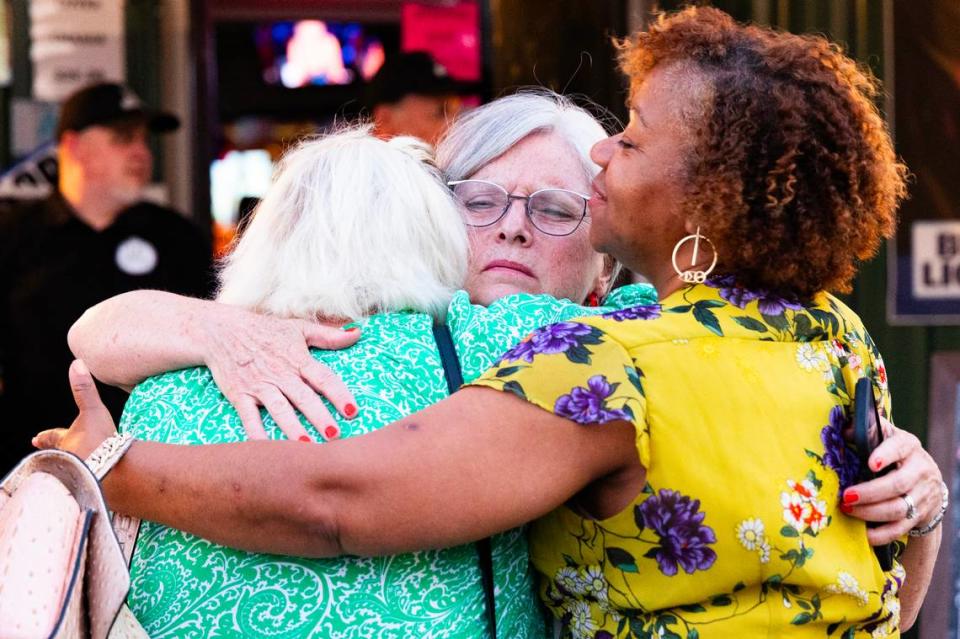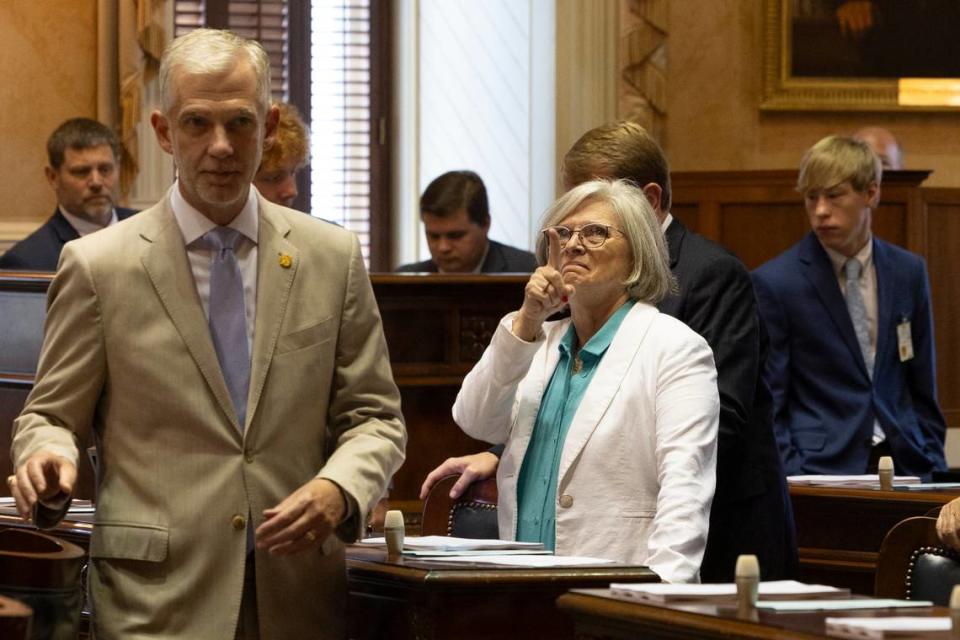Abortion-ban vote ends in Sister Senators ouster. Did attacks on issue work on others?
The women usually found themselves together on the South Carolina Senate floor, sometimes disagreeing. After all, three are Republicans, two Democrats.
Tuesday night, in a dimly lit bar in rural Lexington County, they found each another in an embrace. They all got one green tea shot, as state Sen. Katrina Shealy gave a speech to her fellow female senators, who she considers sisters. It had been a long, nearly 102 degree, heat-filled day of campaigning for Shealy, who had just conceded to her opponent Carlisle Kennedy. The five clinked their paper cups, tears in eyes, but smiles on faces.
Their words were muffled by the live music at Bubba’s Pub and Grub, but some words from them and supporters could be overheard: painful, fierce, bittersweet, powerful.
They were the only five women incumbents running for the South Carolina Senate after Mia McLeod, I-Richland, decided not to run. Now, the three GOP women are gone.
The end came slowly, as Sens. Penry Gustafson and Sandy Senn lost their June 11 primaries. Shealy lost two weeks later in the runoffs. The races were different in geography, turnout and opponents. But one identical thing ultimately ousted them: abortion.
Wednesday, the three Republican woman huddled for a final time on the Senate floor. They held up the John F. Kennedy Profile in Courage Award they received a little over a year ago because the trio broke party ranks to block a near total abortion ban with limited exceptions. They hadn’t been allowed to present the award in the statehouse before, because it was “too controversial,” Shealy said.
“It’s beautiful, and I am proud of it, and I’m proud of losing this Senate race just to get this because I stood up for the right thing,” Shealy said in a speech to the Senate on Wednesday. “I stood up for women. I stood up for children. I stood up for South Carolina. All of these sister senators here with me, we’re not ashamed to be called sister senators, we’re not ashamed of anything we did.”
Since April 2023, Sister Senators attacked on abortion
It was no surprise when Shealy, Senn and Gustafson saw their faces plastered across mailers, billboards, Facebook messages and more in April 2023.
The trio had just blocked the abortion bill with limited exceptions. They are no doubt pro-life, they say. But the messaging against them said otherwise. Threats against their re-elections were prominent.
Groups went after Shealy at her church following that vote. A man with signs that said “Katrina Shealy is not pro-life,” would sit outside her church, along with photos of babies cut up. The pastor told him to go away.
A month later, before the three Republican women held model spines sent by groups wanting nearly all abortions outlawed, Students for Life put fliers on windshields in Shealy’s church parking lot. The fliers said Shealy Senn, Gustafson and others were not pro-life and were “baby killers.”
A letter sent to Students for Life from the church and others asked the the Va.-based organization to not do it again. Shealy said the head of the organization wrote back and “all but called my pastor a heathen.”
Kristi Hamrick, vice president of media & policy, Students for Life Action and America, wrote in an email “Beginning a year ago, we were informing voters about the senator’s actions in support of abortion and to block vital legislation. It seems like she is desperate to talk about anything other than her record of joining with pro-abortion Democrats to block a Republican pro-life bill. The first I have heard of any alleged incidents was from your email.”
A year later, similar messaging amped up against the women before the June 11 primary. But not in the way expected, not nearly with as much force as some feared.
Gustafson said she definitely noticed an increase in mailers after her vote; and described a similar level before primary. But Shealy said she hadn’t noticed as much of an increase leading up to June.
Multiple lawmakers across the aisle, Lexington county political figures and activists were aware of the intensity that was brought onto the ‘Sister Senators’ last year. Leading into June, some wondered where it went at first.
For Shealy, a lot of the attacks leading up to the primary referenced abortion without outright saying it.
Both Kennedy and Zoe Warren, Shealy’s primary challengers, often refered to themselves as having more conservative values, and being a “true conservative.” Warren ran his campaign asserting he was for “person hood.”
Gustafson’s opponent, Allen Blackmon, campaigned at large churches where he talked about his pro-life values. Senn’s opponent, state Rep. Matt Leber, went after her in their heated race, and abortion was a central theme.
Before the primaries, multiple South Carolina political watchers and politicians said for a majority of people, abortion was not going to drive people to vote.
A Winthrop University poll released in early June indicated only 37% of South Carolinians support a ban on most abortions after six weeks of pregnancy while 43% are in opposition. The survey also included that a majority of South Carolinians were in favor of exceptions.
Even if abortion didn’t drive voters to the polls, the trio’s vote made them a target for opponents to marshal a select group of motivated voters.
Abortion used across the aisle, but didn’t affect all candidates
For many candidates this election, abortion was a main attack issue. Although it usually divides party lines, it was used heavily in both party’s internal campaign efforts.
In the contentious District 26 race to succeed state Sen. Nikki Setzler, state Sen. Dick Harpootlian, D-Richland, attacked the abortion record of state Rep. Russell Ott, D-Calhoun.
“The way he’s voted indicates a total lack of respect for women and their ability to make their own healthcare decisions,” Harpootlian said about what he called Ott’s extreme position on abortion.
Harpootlian also took to social media to voice his concerns over the issue.
“BREAKING: In a radio interview this morning, @reprussellott revealed his support for a 12-15 week abortion ban,” Harpootlian wrote via Twitter on May 20. “Even Trump doesn’t support that! Disappointed but not surprised-this is a dangerous position for anyone in 2024 post-Roe, but especially a Democrat. Hear it yourself.”
Attached was a video of Ott who said six weeks was not adequate, but starting at 12-15 weeks is a place that he would like to start.
“He has certainly tries to distort the truth on that issue and several other issues to try to scare voters and win the race off of negativity,” Ott said. “It’s one of the issues that matters to a lot of voters, and I think it should.”
The issue did not seem to drive voter turnout. Ott won the primary.
In the Upstate state House District 6 race, Freedom Caucus member state Rep. April Cromer was scrutinized by her opponent Kyle White, who came after her for her support on the “South Carolina Prenatal Equal Protection Act of 2023. The bill sparked outrage from both Democrats and Republicans, which defined an unborn child as a person at any stage of development. It said an “unborn child who is a victim of homicide” is afforded equal protection under the homicide laws of the state.
Cromer requested she be added as a sponsor of the bill March 2, 2023, according to state house records, even though on social media, she said she would “never and would never advocate for punishing women. That’s not who we are as a community.”
The same bill was used to attack Lexington County state Rep. RJ May and vice chair of the Freedom Caucus, but in a misleading manner, May said.
“Instead of protecting life, radical RJ MAY proposed a bill to sentence women — our daughters and granddaughters — to death who have abortions. RJ MAY is too extreme!” a flier from the Palmetto Truth Project that circulated in May’s district read.
A note at the bottom of the mailer read “*Yes, even victims of rape and incest! Fortunately common sense Republicans said no to RJ May.”
May didn’t propose the bill. According to state house records, May’s name was never on the bill. Multiple members of the Freedom Caucus, however, did sign onto the bill.
While candidates on both sides of the aisle were attacked on abortion, it ultimately didn’t influence voters in the way it did with other races.
Abortion is not the only issue. But for passionate voters, it drives them to polls
Shealy and her supporters asserted that abortion was not the only issue before the primary, citing the economy and immigration as important to voters. Ott agreed.
“Not everyone is a single issue voter,” Ott said before the election. “I’ve heard a lot about job creation, business, keeping the community safe. I don’t know that I would rank it at the very top but it’s certainly a very important issue to people.”
After the election, state Senate Majority Leader Shane Massey, R-Edgefield, asserted that the three woman were not voted out on a single issue. Republican voters don’t like gender wars, he said, and the campaigns against the women did a good job at painting them as “squishy and out of touch.”
“When you’re on CNN, and you’re on MSNBC, when you’re on the front page of The New York Times and the front page of the Washington Post, and you’re repeatedly sticking your finger in the eye of a lot of conservative folks ... it’s not about one issue,” Massey said.
But many Lexington County community members, politicians and leaders said before Tuesday that Shealy’s position as a senator was secure.
“Katrina Shealy is the real deal,” Lexington Town Council Member Gavin Smith said. “She’s not a politician who makes false promises, she’s a leader who delivers real results.”
In the June 11 primaries, Shealy beat Kennedy by 4 percentage points. In the runoff, she lost by 25 percentage points.
Too few people know who their local legislator is, Vicki Ringer, director of public affairs at Planned Parenthood South Carolina. Even for a senator like Shealy, who had been in office for 12 years and had a number of people describe her widespread influence, she herself admitted she never assumes people know who she is when she walks into a room.
“People should know that Senn, Shealy and Gustafson know their districts, know their constituents and know how they feel about abortion and contraceptives and IVF and other reproductive health issues that are under attack,” Ringer said before the elections. “They know where their voters are, and polling in their districts says that their constituents support what they did in the Senate last year.”
The issue has become an extremely divisive argument that didn’t exist before, Ringer said.
In her goodbye speech on the Senate floor, Senn asked the body of legislators to consider allowing the JFK Courage award to have a place in the Senate. The Sister Senators had been told it was “too controversial” to be in the body. She said she hoped they would consider allowing the award to be there as a symbol of their work and legacy.
“By god I’m proud of it,” Shealy said, talking about the award. “There’s nothing anybody can do to hurt me now. So, take a look. This is what the Senate seat cost. Somebody better do the job, I’m leaving. I’m going to be out there saving children and families some other way.”





